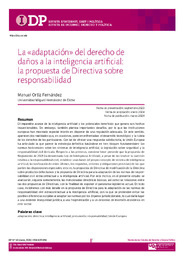Resumen :
El imparable avance de la inteligencia artificial y los potenciales beneficios que genera son hechos
incuestionables. Sin embargo, también plantea importantes desafíos, por lo que las instituciones
europeas han mostrado especial interés en disponer de una regulación adecuada. En este sentido,
aparecen dos realidades que, en ocasiones, parecen enfrentadas: el desarrollo tecnológico y la tutela
de los derechos de los particulares. Con tal de ofrecer una respuesta satisfactoria, la Unión Europea
ha articulado la que parece la estrategia definitiva basándose en tres bloques fundamentales: las
normas horizontales sobre los sistemas de inteligencia artificial, la legislación sobre seguridad y la
responsabilidad civil derivada. Respecto a las primeras, conviene tener presente que la propuesta de
Reglamento de 2021 (la denominada Ley de Inteligencia Artificial), a pesar de no resolver la cuestión
relativa a la responsabilidad civil, establece unas bases (el propio concepto de sistema de inteligencia
artificial, la clasificación de estos últimos, los requisitos, criterios y obligaciones previstas) de las que
parten las disposiciones especiales; esto es, la propuesta de Directiva de modificación de la Directiva
sobre productos defectuosos y la propuesta de Directiva para la adaptación de las normas de responsabilidad
civil extracontractual a la inteligencia artificial. Por este motivo, en el presente estudio se
analizarán, siquiera someramente, las mencionadas directrices básicas, así como las relaciones entre
las dos propuestas de Directivas, con la finalidad de exponer el panorama legislativo actual. En todo
caso, incidiremos con más detalle en la propuesta de Directiva para la adaptación de las normas de
responsabilidad civil extracontractual a la inteligencia artificial, con la que se pretenden evitar las
posibles diferencias surgidas al adaptar las normas por los órganos jurisdiccionales, lo cual daría lugar
a una evidente inseguridad jurídica, a una fragmentación y a un descenso de inversión económica en
este sector
The unstoppable spreading of artificial intelligence and the potential benefits it generates are unquestionable
facts. However, it also poses significant challenges, so European institutions have shown special interest
in having adequate regulation. In this sense, there are two realities that sometimes appear to be confronted:
technological development and the protection of the rights of individuals. In order to provide a satisfactory
response, the European Union has articulated what appears to be the definitive strategy based on three fundamental
blocks: the horizontal rules on artificial intelligence systems, security legislation and the derived
civil liability. Regarding the first two, it should be noted that the proposed Act of 2021 (the so-called Artificial
intelligence act), despite not resolving the civil liability issue, lays a foundation (the concept of an artificial
intelligence system itself, the classification of the latter, the requirements, criteria and obligations derived)
from which special provisions arise; this is, the proposed Directive on the modification of the Directive on
defective products and the proposed Directive for the adaptation of extra-contractual civil liability rules to
artificial intelligence. For this reason, the aforementioned basic guidelines, as well as the relations between
the two proposals of Directives, will be analysed in this study, even in a shallow manner, in order to expose
the current legislative frame. In any case, we will affect in more detail the proposal of the Directive for the
adaptation of extra-contractual civil liability rules to artificial intelligence, with which we aim to avoid the
possible differences arising when the jurisdictional bodies adapt the rules, which would result in an evident
legal insecurity, in fragmentation and a decrease in economic investment in this sector
|
 La licencia se describe como: Atribución-NonComercial-NoDerivada 4.0 Internacional.
La licencia se describe como: Atribución-NonComercial-NoDerivada 4.0 Internacional.
.png)
